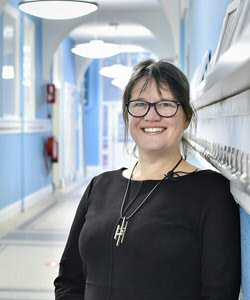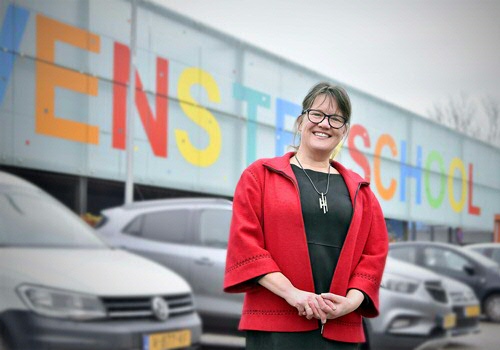The history of education as a mirror for current issues

Photos: Elmer Spaargaren
Freedom of education, equal opportunities, the pedagogical state... Hilda Amsing knows all there is to know. She is one of the first two Aletta Jacobs professors to be appointed at the University of Groningen (UG). These chairs have been created for female researchers in order to increase gender equality at professor level at the UG. Amsing focuses on education in a historical context and believes that knowledge of this is relevant to current issues.
Why is knowledge of educational history important for understanding contemporary education?
Take, for example, the current debate on freedom of education. Some people are calling for Article 23 of the Constitution to be scrapped. But that freedom of education is a hard-won freedom. The school struggle helped to highlight differences between groups, but we have also seen that this freedom of education has had an emancipating effect. Catholics, once seen as second-class citizens, have been able to develop their own identity in their own schools. History has also taught us that, from a liberal perspective, it is possible to be both for and against freedom of education and that it is entirely possible to be a unitary state with an education system that also allows for the existence of religious schools. If you are aware of these things, you can have a more nuanced debate and groups are more likely to understand each other.
In your research, you focus on equal opportunities in primary and secondary education. How can this be improved?
The choice of school needs to take place later; that’s one of the main things that needs to change. So not when the children are 12, but when they’re 15 or maybe even 16. We know that making this decision at such a young age is particularly disadvantageous for children from a lower socio-economic background. Postponing this decision gives children more time to demonstrate what they’re capable of. It also has the great advantage that children with different aptitudes spend more time with each other, allowing them to get to know each other better. This is vital for combatting social segregation.
Ironically, you, too, are now involved in a catch-up process in terms of equal opportunities. Are there similar mechanisms at play when it comes to inequalities in education and opportunities for women in science?
In both cases, the solution starts by recognizing the problem – the realization that it is the system itself that is to blame for the existence of inequality. This applies to both science and education. The problem shouldn’t be passed on to those with fewer opportunities. In both cases it is important that we reflect critically on the meritocratic ideal.

You have published work on peace education in the 1970s and on allegations of indoctrination from right-wing groups. Do you see similarities with the current climate when it comes to gender and inclusiveness policies in (higher) education?
The situation now isn’t that bad. In the 1970s, people were much more afraid of the pedagogical state and indoctrination than they are today. That was all down to the polarizing political climate; differences were exacerbated. For example, if you had a critical stance on environmental issues you would very quickly be labelled a leftist, while such concerns today are more widely shared. Schools that address the climate are unlikely to be accused of indoctrination. Schools’ commitment to being inclusive, whether in terms of gender diversity or cultural diversity, is also widely supported. Today, many people are also calling for a more specific elaboration of what civic education should encompass. Hardly anybody talks about state-defined curricula.
Many schools have been forced to gain experience with distance learning. Will COVID-19 change education permanently?
I don’t think so. Educational historians talk about ‘the grammar of schooling’: elements in education that, despite various attempts to change them, have remained remarkably stable over the years (say, the last 150 years). For example, how we use space (classrooms) and time (timetables), how we classify and assess pupils with grades, the role of teacher and pupils and, for example, how we organize knowledge into school subjects. Even in distance learning you can easily spot elements of that grammar of schooling. Throughout this coronavirus pandemic, schools still prefer to use their classrooms. Teachers strongly believe that the personal relationship they have with their pupils is of great formative value.
What do you do to help societal parties?
Schools occasionally invite me to initiate a debate on their identity, for example, or on a fundamental issue, such as equal opportunities. I hold up a mirror to them by framing the issue in a historical perspective. I then show them how other people have approached particular issues, and sometimes I can also show them the effects that those approaches had. In doing so, I broaden their perspective on their own situation and help them to get the discussion going. Those involved then look at their school in a different way.
Your appointment is a fantastic academic highlight. What else are you proud of?
At various levels I have contributed to our knowledge of inequalities in education in the post-war period: how did academics deal with it, how did politicians talk about it, what were the attitudes within educational practice? My research has resulted in various publications and I am also engaged in public debates about the subject. But I especially share my knowledge with the students, so that they, as the discerning and dedicated educational experts and pedagogues of the future, can contribute towards reducing inequalities in education. And that’s hugely important, because it’s such a difficult problem to overcome.
More information
More news
-
20 January 2026
Alcohol, texting, and e-bikes
-
13 January 2026
Lonneke Lenferink joins The Young Academy
-
08 December 2025
Citizen participation essential for a sustainable energy future
